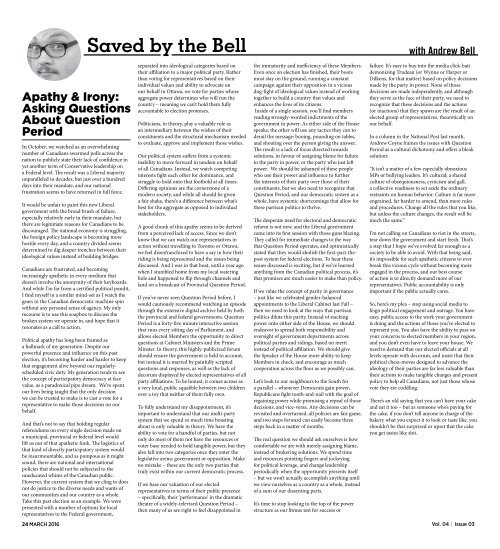Windsor Independent - March 2016
The alternative voice for Windsor and Essex county. Shining a light on local art, music, community, politics and eats. In this issue: Gypsy Chief Goliath, Puscifer, Frustration with the Mayor and Council, The City Grill and more...
The alternative voice for Windsor and Essex county. Shining a light on local art, music, community, politics and eats. In this issue: Gypsy Chief Goliath, Puscifer, Frustration with the Mayor and Council, The City Grill and more...
You also want an ePaper? Increase the reach of your titles
YUMPU automatically turns print PDFs into web optimized ePapers that Google loves.
Saved by the Bell<br />
with Andrew Bell<br />
Apathy & Irony:<br />
Asking Questions<br />
About Question<br />
Period<br />
In October, we watched as an overwhelming<br />
number of Canadians swarmed polls across the<br />
nation to publicly state their lack of confidence in<br />
yet another term of Conservative leadership on<br />
a Federal level. The result was a Liberal majority<br />
unparalleled in decades, but just over a hundred<br />
days into their mandate, and our national<br />
frustration seems to have returned in full force.<br />
It would be unfair to paint this new Liberal<br />
government with the broad brush of failure,<br />
especially relatively early in their mandate, but<br />
there are legitimate reasons for Canadians to be<br />
discouraged. The national economy is struggling,<br />
the foreign policy landscape is becoming more<br />
hostile every day, and a country divided seems<br />
determined to dig deeper trenches between their<br />
ideological values instead of building bridges.<br />
Canadians are frustrated, and becoming<br />
increasingly apathetic in every medium that<br />
doesn’t involve the anonymity of their keyboards.<br />
And while I’m far from a certified political pundit,<br />
I find myself in a similar mind-set as I watch the<br />
gears in the Canadian democratic machine spin<br />
without any personal sense of agency. My only<br />
recourse is to use this soapbox to discuss the<br />
broken system we operate in, and hope that it<br />
resonates as a call to action.<br />
Political apathy has long been framed as<br />
a hallmark of my generation. Despite our<br />
powerful presence and influence on this past<br />
election, it’s becoming harder and harder to keep<br />
that engagement alive beyond our regularlyscheduled<br />
civic duty. My generation tends to see<br />
the concept of participatory democracy at face<br />
value, as a paradoxical pipe dream. We’ve spent<br />
our lives being taught that the only decision<br />
we can be trusted to make is to cast a vote for a<br />
representative to make those decisions on our<br />
behalf.<br />
And that’s not to say that holding regular<br />
referendums on every single decision made on<br />
a municipal, provincial or federal level would<br />
lift us out of that apathetic funk. The logistics of<br />
that kind of directly participatory system would<br />
be insurmountable, and as pompous as it might<br />
sound, there are national and international<br />
policies that should not be subjected to the<br />
uneducated whims of the Canadian public.<br />
However, the current system that we cling to does<br />
not do justice to the diverse needs and wants of<br />
our communities and our country as a whole.<br />
Take this past election as an example. We were<br />
presented with a number of options for local<br />
representatives to the Federal government,<br />
separated into ideological categories based on<br />
their affiliation to a major political party. Rather<br />
than voting for representatives based on their<br />
individual values and ability to advocate on<br />
our behalf in Ottawa, we vote for parties whose<br />
aggregate power determines who will run the<br />
country – meaning we can’t hold them fully<br />
accountable to election promises.<br />
Politicians, in theory, play a valuable role as<br />
an intermediary between the wishes of their<br />
constituents and the structural mechanism needed<br />
to evaluate, approve and implement those wishes.<br />
Our political system suffers from a systemic<br />
inability to move forward in tandem on behalf<br />
of all Canadians. Instead, we watch competing<br />
interests fight each other for dominance, and<br />
struggle to hold onto that foothold at all times.<br />
Differing opinions are the cornerstone of a<br />
modern society, and while all should be given<br />
a fair shake, there’s a difference between what’s<br />
best for the aggregate as opposed to individual<br />
stakeholders.<br />
A good chunk of this apathy seems to be derived<br />
from a perceived lack of access. Since we don’t<br />
know that we can watch our representatives in<br />
action without travelling to Toronto or Ottawa,<br />
we feel disenfranchised to have a say in how their<br />
riding is being represented and the issues being<br />
discussed. And I was in that boat, until a year ago<br />
when I stumbled home from my local watering<br />
hole and happened to flip through channels and<br />
land on a broadcast of Provincial Question Period.<br />
If you’ve never seen Question Period before, I<br />
would cautiously recommend watching an episode<br />
through the extensive digital archive held by both<br />
the provincial and federal governments. Question<br />
Period is a forty-five minute interactive session<br />
that runs every sitting day of Parliament, and<br />
allows elected Members the opportunity to direct<br />
questions at Cabinet Ministers and the Prime<br />
Minster. In theory, this highly-publicized forum<br />
should ensure the government is held to account,<br />
but instead it is marred by painfully scripted<br />
questions and responses, as well as the lack of<br />
decorum displayed by elected representatives of all<br />
party affiliations. To be honest, it comes across as<br />
a very loud, public squabble between two children<br />
over a toy that neither of them fully own.<br />
To fully understand my disappointment, it’s<br />
important to understand that our multi-party<br />
system that we spend so much time boasting<br />
about is only valuable in theory. We have the<br />
ability to vote for a handful of parties, but not<br />
only do most of them not have the resources or<br />
voter base needed to hold tangible power, but they<br />
also fall into two categories once they enter the<br />
legislative arena: government or opposition. Make<br />
no mistake – these are the only two parties that<br />
truly exist within our current democratic process.<br />
If we base our valuation of our elected<br />
representatives in terms of their public presence<br />
– specifically, their ‘performance’ in the dramatic<br />
theatre of a widely-televised Question Period –<br />
then many of us are right to feel disappointed in<br />
the immaturity and inefficiency of these Members.<br />
Even once an election has finished, their boots<br />
must stay on the ground, running a constant<br />
campaign against their opposition in a vicious<br />
dog-fight of ideological values instead of working<br />
together to build a country that values and<br />
enhances the lives of its citizens.<br />
Inside of a single session, you’ll find members<br />
reading strongly-worded indictments of the<br />
government in power. As either side of the House<br />
speaks, the other will use any tactics they can to<br />
derail the message: booing, pounding on tables,<br />
and shouting over the person giving the answer.<br />
The result is a lack of focus directed towards<br />
solutions, in favour of assigning blame for failure<br />
to the party in power, or the party who just left<br />
power. We should be ashamed of these people<br />
who use their power and influence to further<br />
the interests of their party over those of their<br />
constituents, but we also need to recognize that<br />
Question Period, and our democratic system as a<br />
whole, have systemic shortcomings that allow for<br />
these partisan politics to thrive.<br />
The desperate need for electoral and democratic<br />
reform is not new, and the Liberal government<br />
came into its first session with those guns blazing.<br />
They called for immediate changes to the way<br />
that Question Period operates, and optimistically<br />
stated that they would abolish the first-past-thepost<br />
system for federal elections. To hear these<br />
issues discussed is exciting, but if we’ve learned<br />
anything from the Canadian political process, it’s<br />
that promises are much easier to make than policy.<br />
If we value the concept of parity in governance<br />
– just like we celebrated gender-balanced<br />
appointments to the Liberal Cabinet last Fall –<br />
then we need to look at the ways that partisan<br />
politics dilute this parity. Instead of stacking<br />
power onto either side of the House, we should<br />
endeavor to spread both responsibility and<br />
oversight of government departments across<br />
political parties and ridings, based on merit<br />
instead of political affiliation. We should give<br />
the Speaker of the House more ability to keep<br />
Members in check, and encourage as much<br />
cooperation across the floor as we possibly can.<br />
Let’s look to our neighbours to the South for<br />
a parallel – whenever Democrats gain power,<br />
Republicans fight tooth-and-nail with the goal of<br />
regaining power while promising a repeal of those<br />
decisions, and vice-versa. Any decisions can be<br />
revisited and overturned, all policies are fair game,<br />
and two steps forward can easily become three<br />
steps back in a matter of months.<br />
The real question we should ask ourselves is how<br />
comfortable we are with merely assigning blame,<br />
instead of brokering solutions. We spend time<br />
and resources pointing fingers and jockeying<br />
for political leverage, and change leadership<br />
periodically when the opportunity presents itself<br />
– but we won’t actually accomplish anything until<br />
we view ourselves as a country as a whole, instead<br />
of a sum of our dissenting parts.<br />
It’s time to stop looking to the top of the power<br />
structure as our litmus test for success or<br />
failure. It’s easy to buy into the media click-bait<br />
demonizing Trudeau (or Wynne or Harper or<br />
Dilkens, for that matter) based on policy decisions<br />
made by the party in power. None of those<br />
decisions are made independently, and although<br />
they serve as the face of their party, we need to<br />
recognize that these decisions and the actions<br />
(or inactions) that they spawn are the result of an<br />
elected group of representatives, theoretically on<br />
our behalf.<br />
In a column in the National Post last month,<br />
Andrew Coyne frames the issues with Question<br />
Period as a cultural dichotomy and offers a bleak<br />
solution:<br />
“It isn’t a matter of a few especially obnoxious<br />
MPs or bullying leaders. It’s cultural; a shared<br />
culture of obsequiousness, cynicism and gall,<br />
a collective readiness to set aside the ordinary<br />
restraints on human behavior. Culture is far more<br />
engrained, far harder to amend, than mere rules<br />
and procedures. Change all the rules that you like,<br />
but unless the culture changes, the result will be<br />
much the same.”<br />
I’m not calling on Canadians to riot in the streets,<br />
tear down the government and start fresh. That’s<br />
a step that I hope we’ve evolved far enough as a<br />
society to be able to avoid. With that being said,<br />
it’s impossible for such apathetic citizens to ever<br />
break this vicious cycle without becoming more<br />
engaged in the process, and our best course<br />
of action is to directly demand more of our<br />
representatives. Public accountability is only<br />
important if the public actually cares.<br />
So, here’s my plea – stop using social media to<br />
feign political engagement and outrage. You have<br />
easy, public access to the work your government<br />
is doing and the actions of those you’ve elected to<br />
represent you. You also have the ability to pass on<br />
your concerns to elected members in your region,<br />
and you don’t even have to leave your house. We<br />
need to demand that our elected officials at all<br />
levels operate with decorum, and insist that their<br />
political chess-moves designed to advance the<br />
ideology of their parties are far less valuable than<br />
their actions to make tangible changes and present<br />
policy to help all Canadians, not just those whose<br />
vote they are coddling.<br />
There’s an old saying that you can’t have your cake<br />
and eat it too – but as someone who’s paying for<br />
the cake, if you don’t tell anyone in charge of the<br />
bakery what you expect it to look or taste like, you<br />
shouldn’t be that surprised or upset that the cake<br />
you get tastes like shit.<br />
24 MARCH <strong>2016</strong> Vol. 04 | Issue 03








